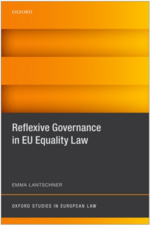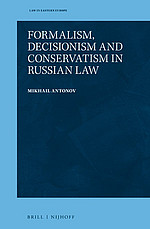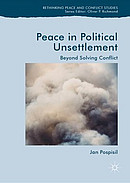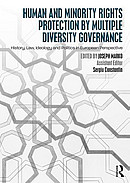Publikationen
Reflexive Governance in EU Equality Law
von Emma Lantschner

Oxford Studies in European Law
- Presents an interdisciplinary approach, bringing together legal questions and approaches with political theories and empirical social science research
- Provides deep analysis of implementation practice of the two central equality directives, Racial Equality Directive 2000/43/EC and the Employment Equality Directive 2000/78/EC
- Develops indicators to facilitate the monitoring of compliance with the non-discrimination acquis of candidate countries and EU Member States, to serve as a tool in the political dialogue between the Commission, the civil society sector, and the state authorities
- Analyses the status quo in view of evidence-based law and policymaking in the field of equality and non-discrimination
Formalism, Decisionism and Conservatism in Russian Law
von Mikhail Antonov

Die Monographie untersucht den Einfluss kritischer Konzepte wie Formalismus, Konservatismus sowie Dezisionismus auf das rechtswissenschaftliche Denken Russlands. Antonov setzt sich dabei kritisch mit konservativen Narrativen der Kultur eines rechtlichen Sonderwegs Russlands auseinander, welche sowohl juristische Ausbildung, Wissenschaft sowie Praxis in Russland prägen. Diese Narrative – so der Autor – beruhen im Wesentlichen auf der Idee eines omnipotenten Staates sowie auf dem formalen Rechtspositivismus als Ausdruck staatlicher Souveränität. Die Instrumentalisierung dieser Narrative für die Rechtfertigung staatlichen Handelns sowie gewisser Ausnahmen in der Geltung des Gleichbehandlungsgrundsatzes hinsichtlich politischer, religiöser, sexueller sowie anderer Minderheiten wird dabei ebenfalls einer kritischen Analyse unterzogen.
Human and Minority Rights Protection by Multiple Diversity Governance: History, Law, Ideology and Politics in European Perspective
von Joseph Marko, Sergiu Constantin
Human and Minority Rights Protection by Multiple Diversity Governance provides a comprehensive overview and critical analysis of minority protection through national constitutional law and international law in Europe. Using a critical theoretical and methodological approach, this textbook:
- provides a historical analysis of state formation and nation building in Europe with context of religious wars and political revolutions, including the (re-)conceptualisation of basic concepts and terms such as territoriality, sovereignty, state, nation and citizenship;
- deconstructs all primordial theories of ethnicity and provides a sociologically informed political theory for how to reconcile the functional prerequisites for political unity, legal equality and social cohesion with the preservation of cultural diversity;
- examines the liberal and nationalist ideological framing of minority protection in liberal-democratic regimes, including the case law of the European Court of Human Rights and the European Court of Justice;
- analyses the ongoing trend of re-nationalisation in all parts of Europe and the number of legal instruments and mechanisms from voting rights to proportional representation in state bodies, forms of cultural and territorial autonomy and federalism.
This textbook will be essential reading for students, scholars and practitioners interested in European politics, human and minority rights, constitutional and international law, governance and nationalism.
Peace in Political Unsettlement: Beyond Solving Conflict
von Jan Pospisil

International peacebuilding has reached an impasse. Its lofty ambitions have resulted in at best middling success, punctuated by moments of outright failure. The discrediting of the term ‘liberal peacebuilding’ has seen it evolve to respond to the numerous critiques. Notions such as ‘inclusive peace’ merge the liberal paradigm with critical notions of context, and the need to refine practices to take account of ‘the local’ or ‘complexity’. However, how this would translate into clear guidance for the practice of peacebuilding is unclear. Paradoxically, contemporary peacebuilding policy has reached an unprecedented level of vagueness. Peace in political unsettlement provides an alternative response rooted in a new discourse, which aims to speak both to the experience of working in peace process settings. It maps a new understanding of peace processes as institutionalising formalised political unsettlement and points out new ways of engaging with it. The book points to the ways in which peace processes institutionalise forms of disagreement, creating ongoing processes to manage it, rather than resolve it. It suggests a modest approach of providing ‘hooks’ to future processes, maximising the use of creative non-solutions, and practices of disrelation, are discussed as pathways for pragmatic post-war transitions. It is only by understanding the nature and techniques of formalised political unsettlement that new constructive ways of engaging with it can be found.






